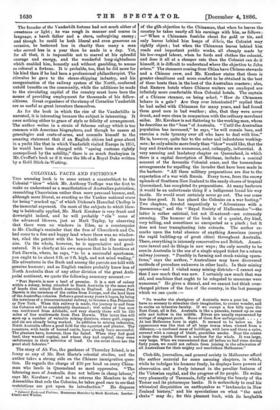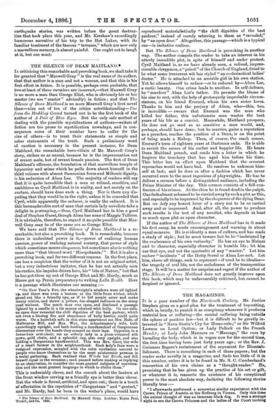COLONIAL FACTS AND FICTIONS.*
Tins amusing book is to some extent a counterblast to the Colonial " blow " which Mr. Anthony Trollope was the first to make us understand as a manifestation of Australian patriotism, resembling Chauvinism rather than mere personal bounce, and, although more liberal, as exacting as the Yankee national craze for being " cracked up," of which Dickens's Hannibal Chollop is
the immortal exponent. On most of the subjects to which blow- ing is habitually applied, Mr. Mark Kershaw is very frank and downright indeed, and he will probably "rile" some ef the advanced blowers, just as Mark Tapley, by observing that there were no windows in Eden, as a counterpoise to Mr. Chollop's reminder that the firm of Chuzzlewit and Co. had come to a free and happy land where there was no window- tax, riled the patriot with the bowie-knife and the accurate aim. On the whole, however, he is appreciative and good- natured. It is chiefly at his own expense that he is facetious at
Port Darwin, where, he says, "to be a successful sportsman, you ought to be about 8 ft. or 9 ft. high, and not mind wading."
His adventures in the Bush and among the parrots are told with genuine humour ; and as English readers probably know less of North Australia than of any other division of the great Anti- podal continent, we quote the following summary account :—
" Port Darwin is now a land of promise. It is a sort of colony within a colony, being attached to South Australia by the same sort of bonds that attach South Australia to England. At present Port Darwin is the terminus of the cables from Europe, and the land lines of the Australian colonies. Before a great many years it hopes, by being the terminus of a transcontinental railway, to become a San Francisco or New York. When this railway is made, the journey to and from the Colonies will be considerably shortened; 600 miles of line now run northward from Adelaide, and very shertly there will be 150 miles of line southwards from Port Darwin. This latter line will open up a number of valuable mining districts, where gold, copper, and tin are already being worked. In addition to mining industries, North Australia offers a good field for the squatter and planter. The squatters, with herds of horned cattle, have already been successful. The planters have, however, thus far failed. When they had good land, they wanted capital, and where they had capital, they were unfortunate in their selection of land. On the coast there are the pearl shell fisheries."
The story of Ah Foo, the gardener of Thursday Island, is as funny as any of Mr. Bret Harte's celestial studies, and the author takes a strong side on the Chinese immigration ques- tion. He regards the charge of £30 per head on every China- man who lands in Queensland as most oppressive. "The labouring man of Australia does not believe in cheap labour," says Mr. Kershaw ; "and as he returns the Members to the Assemblies that rule the Colonies, he takes good care to see that restrictions are put upon its introduction." He disposes
• Colonial Facts and Fictions. Humorous Sketches. by Mark Kershaw. London : (.lotto and Windas.
of the glib objection to the Chinaman, that when he leaves the country he takes nearly all his earnings with him, as follows : —" When a Chinamen fossicks about for gold or tin, and only leaves behind him heaps of debris, the Colonist may rightly object ; but when the Chinaman leaves behind him roads and important public works, all cheaply made by his low-waged labour, when he feeds and clothes the colonist, and does it all at a cheaper rate than the Colonist can do it himself, it is difficult to understand where the objection to John arises." The steamers coming from China have Chinese stewards and a Chinese crew, and Mr. Kershaw states that there is greater cleanliness and more comfort to be obtained in the best of these boats than in the best of the Australian coasters ; also, that Eastern hotels where Chinese waiters are employed are infinitely more comfortable than Colonial hotels. The captain
of a Chinese steamer, on being asked, "How do Chinamen behave in a gale ? Are they ever intoxicated ?" replied that-
he had sailed with Chinamen for many years, and had found them good men in bad weather ; also, that they were never drunk, and were clean in comparison with the ordinary merchant sailor. Mr. Kershaw is not flattering to the working man, whom he describes as the " boss " of Australia. "Until the Australian population has increased," he says, "he will remain boss, and exercise a rude tyranny over all who have to deal with him."
He is, however, quite fair to the sober and industrious working- men ; he only admits more freely than "blow" would like, that the lazy and drunken are numerous, and, unhappily, influential. A very amusing and laudatory chapter on Queensland, in which there is a capital description of Brisbane, includes a comical account of the favourite Colonial scare, and the tremendous arrangements for repelling the invader that have been made in the harbour. "All these military preparations are due to the expectation of a war with Russia. Every town, from the snowy uplands of Southern New Zealand to the sandy shores of tropical Queensland, has completed its preparations. At many harbours it would be an unfortunate thing if a belligerent found his way inside. He would most certainly never go out. The war scare has done good. It has placed the Colonies on a war footing." Two chapters, devoted respectively to "Adventures with a Boomerang," and the Royal Society of Halloomaloo "—the latter is rather satirical, but not ill-natured—are extremely amusing. The humour of the book is of a quaint, dry kind, very telling, and sometimes as unexpected as a pinch ; but it does not bear transplanting into extracts. The author re- marks upon the total absence of anything American (except the rapid building-up of great cities) throughout Australia.
There, everything is intensely conservative and British. Ameri- cans invent and do things in new ways ; the only novelty to be seen in Australia is the use of a single nipped ticket for a return railway journey. "Possibly in farming and stock-raising opera- tions," says the author, "Australians may have discovered
methods of procedure unknown in other lands. In their mining operations—and I visited many mining districts—I cannot say that I saw much that was new. I certainly saw much that wae old, and machines that ought to be relegated to museums were numerous." He gives a dismal, and we cannot but think over-
charged picture of the face of the country, in the last passage- which we can quote :—
"No wonder the aborigines of Australia were a poor lot. They have no scenery to stimulate their imagination, to create wonder, and to excite an inventive faculty. If we except a few hills upon the East Coast, all is flat. Australia is like a pancake, turned up on one aide and hollow in the middle. Rivers are usually represented by
strings of stagnant pools. Some of them flow underground At last Melbourne hove in sight. It seemed to be below us. Its appearance was like that of all large towns when viewed from a digtance,—a confused mass of buildings, with here and there a spire, covered with a canopy of bluish, gauzelike smoke. Near the centre a large dun cupola formed a nucleus for the whole. It was large, very large. When we remembered that all before us had risen during forty years, we could not refrain from joining in the admiration of all Australians for their mighty and marvellous Melbourne."
Club-life, journalism, and general society in Melbourne afford the author material for some amusing chapters, in which, while he indulges his humour freely, he displays keen powers of observation and a lively interest in the peculiar features of the Victorian capital, and the progress of its people. He writes very pleasantly of Tasmania, fully admitting the beauty of the Tamar and its picturesque banks. It is melancholy to read his whimsical disquisition on earthquakes as "landmarks in New Zealand history," and his speculations on what "the next shake" may do ; for this pleasant book, with its laughable earthquake stories, was written before the great destruc- tion that took place this year, and Mr. Kershaw'a exceedingly humorous narrative of his trip to the Hot Lakes, with its familiar treatment of the famous "terraces," which are now only a marvellous memory, is almost painful. One ought not to laugh at it, but one must.







































 Previous page
Previous page